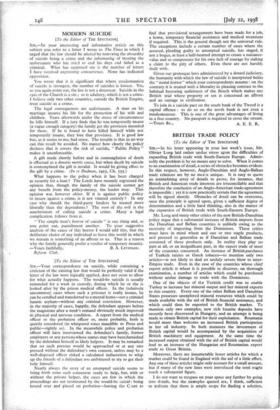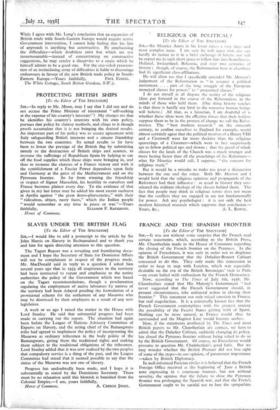Sta,—In his letter appearing in your last week's issue, Mr.
Olivier Long laid rather undue stress upon the difficulties of expanding British trade with South-Eastern Europe. Admit- tedly the problem is by no means easy to solve. When it comes to an examination of detail, a series of obstacles becomes evident. In this respect, however, Anglo-Danubian and Anglo-Balkan trade relations are by no meals unique. It is easy to quote an intimidating array of details to prove, for instance, that British and American trade interests are irreconcilable and that therefore the conclusion of an Anglo-American trade-agreement is impossible ; yet it is now practically certain that the agreement will be signed shortly. Obstacles of detail can be overcome, once the principle is agreed upon, given a sufficient degree of determination and a little hard thinking, also in the matter of the expansion of British trade with South-Eastern Europe.
Mr. Long and many other critics of the new British-Danubian policy argue that a substantial increase of British imports from the Danubian and Balkan countries is unlikely owing to the necessity of importing from the Dominions. These critics must have in mind wheat and one or two staple products, and proceed to generalise as if Danubian and Balkan trade consisted of those products only. In reality they play no part at all; or an insignificant part, in the export trade of most of the countries concerned. An increase of British purchases of Turkish raisins or Greek tobacco—to mention only two articles—is not likely to deal an unduly severe blow to inter- Empire trade. Even in the case of the countries whose chief export article is wheat it is possible to discover, on thorough examination, a number of articles which could be purchased without undue damage to trade with the Dominions.
One of the objects of the Turkish credit was to enable Turkey to increase her mineral output and her mineral exports to this country. Every one of the other Balkan and Danubian States possesses unexplored mineral resources which could be made available with the aid of British financial assistance, and which could then be exported to the British market. To mention only two examples, new rich bauxite deposits have recently been discovered in Hungary, and an attempt is being made to obtain British capital for their exploitation. Roumania would more than welcome an increased British participation in her oil industry. In both instances the investment of British capital would be accompanied by the acquisition of British machinery and equipment. At the same time the increased output obtained with the aid of British capital would lead to an increase of the Hungarian and Roumanian export trade to Great Britain.
Moreover, there are innumerable lesser articles for which a market could be found in England with the aid of a little effort. Any one of these articles might only account for a small amount, but if many of the new lines were introduced the total might reach a substantial figure,
I do not want to trespass on your space any further by going into details, but the examples quoted are, I think,, sufficient to indicate; that there is ample scope for finding a solution.
While I agree with Mr. Long's conclusion that an expansion of British trade with South-Eastern Europe would require active Government intervention, I cannot help feeling that his line of approach is anything but constructive. By emphasising the difficulties—which doubtless exist but which are not insurmountable—instead of concentrating on constructive suggestions, he may render a disservice to a cause which he himself admits to be a good one. For the one-sided presenta- tion of an intimidating array of difficulties is liable to discourage endeavours in favour of the new British trade policy in South-












































 Previous page
Previous page